
Beyond the Screen: How Sport and Research Join Forces Against Hate Speech
Online hate speech has become a growing challenge in today’s digital world, and sport, with all its passion and visibility, often feels its impact most intensely. This shared concern brought together representatives from the FIA, the ATP, the Football Association, and Dublin City University at the 2025 Social Football Summit in a dedicated panel, where each offered insight into how their organisations are working to create safer and more respectful online spaces.
The FIA opened the conversation by highlighting its collaborative United Against Online Abuse initiative. By bringing together sports organisations, public institutions, and technology partners, the FIA aims to build a collective response to online harm. This work is supported by AI-driven tools that help detect harmful content, as well as research programmes designed to understand where abuse originates and how it spreads.
Building on this idea of protection and support, the ATP Tour shared its player-focused approach. Through the Safe Sport programme, the organisation uses technology to monitor and filter abusive messages sent to tennis players, easing the emotional burden that constant online exposure can create. At the same time, education and wellbeing resources complement this effort, ensuring that athletes are not left to navigate digital negativity on their own.
A similar commitment to safeguarding the community came from the Football Association with its Enough is Enough campaign, which encourages players, fans, parents, and coaches to speak up when they encounter abuse, reinforcing the idea that everyone has a role in shaping a healthier environment. The FA has also strengthened the mechanisms that allow serious online harassment to be investigated, reflecting a belief that online behaviour deserves the same accountability as actions on the pitch.
Adding a research dimension, Dublin City University emphasised the importance of understanding online hate at its roots: DCU’s work uses AI and data analysis to identify patterns of abusive language and explore the contexts in which it spreads, also considering the still largely unexplored languages. Their research helps ensure that the tools used to moderate online spaces are fair, transparent, and responsive to real human communication.
Taken together, these perspectives show that addressing online hate requires more than one solution. It calls for a blend of technology, education, empathy, and shared responsibility, and by working in unison, sports organisations and researchers are helping to shape a digital world where respect can flourish, both on and off the field.
By Enovation Consulting



